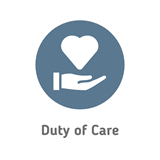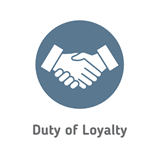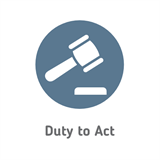Articles
Fiduciary Responsibility of HOA Board Members
As a Board member, you manage your Association’s money, property, and business. Serving on the Board positively impacts your community’s well-being. However, you must understand the fiduciary responsibility of HOA Board Members to serve responsibly and avoid legal liability.
Corporate Law and Fiduciary Duties
Corporate law outlines the fiduciary duties of HOA Board members under individual state laws. Most HOAs are nonprofit corporations formed by filing Articles of Incorporation. Since Board members serve in a position of trust, state laws impose a fiduciary duty on them. This duty requires board members to act in the best interests of the HOA. Fiduciary responsibility applies even though HOAs are nonprofit and Board members are volunteers.
The Three Components of Fiduciary Responsibilities
Fiduciary duties include three components: duty of care, duty of loyalty, and duty to act within the scope of authority.

Duty of Care
Research, research, research! Board members must make informed decisions, often requiring research before acting or voting on HOA matters. Learn your Association’s CC&Rs and state statutes. Board members must act prudently, use sound judgment, and avoid impulsive actions. For example, you can’t penalize a homeowner for painting their garage door orange and blue unless documents prohibit it. Acting with fiduciary responsibility requires thorough research.

Duty of Loyalty
Board members must act fairly, in good faith, and in the Association’s best interest. Personal interests or gain must not influence decisions. Avoid conflicts of interest. For example, abstain from voting on vendors if a friend or family member owns a competing company. Loyalty to fiduciary responsibility maintains trust.
Board members must also protect confidentiality. Do not disclose this information if a homeowner shares financial struggles to arrange a payment plan. Confidentiality is a critical part of fiduciary responsibility.

Duty to Act
Boards must perform required duties and avoid acting beyond their authority. Their authority comes from state laws and Governing Documents. These include Articles of Incorporation, Bylaws, CC&Rs, and Rules and Regulations. Boards must follow laws and Governing Documents when performing duties. Aligning actions with fiduciary responsibility prevents overstepping.
Upholding Fiduciary Responsibility
Fiduciary responsibilities are essential for community leadership. Your management company should provide tools and encourage Board training. If you have questions, contact your community manager.
Understanding fiduciary responsibility is crucial for an HOA Board member. Following the duties of care, loyalty, and authority protects you from legal issues and benefits the community. Your management company should offer support and training to help you navigate these responsibilities. Prioritize informed decisions, act in the community’s best interest, and uphold Board integrity.
